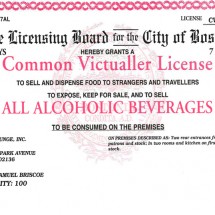Law Offices of John P. Connell, P.C.:
Contained within a lengthy “economic development” bill, a State House Committee on July 29, 2014 released a proposed revision to Massachusetts General Law, Chapter 138, which will, among other things, authorize the City of Boston to issue up to 75 new liquor licenses over the next three years. Under this new bill, the first 25 of these licenses shall consist of 20 All Alcoholic Beverage Licenses and 5 Wine & Malt Licenses. The first 25 licenses will be available this year; the second phases of 25 licenses will be available September 1, 2015; and the third phase of 25 licenses will be available September 1, 2016.
After further revisions to the Committee’s proposed new law, the legislature approved on August 1, 2014 (with certain errata corrections) this bill which would make 15 of the proposed 60 proposed All Alcoholic Beverage Licenses available citywide and which would be transferable, making them significantly sought after licenses. The balance of 45 All Alcoholic Licenses and all 15 of the Wine & Malt Licenses to be issued would be so-called “no value” licenses in that they will not be transferable, as most of the current licenses are within the City of Boston. Moreover, these new “no-value” licenses would only be available to applicants seeking to locate the licensed premises within following districts: (1) within the zoning districts of Dorchester, Hyde Park, Jamaica Plain, Mattapan, Mission Hill or Roxbury; or (2) within the Main Street Districts as defined by the BRA, which are found on the BRA’s map entitled “Potential Areas for Additional Liquor Licenses.” Main Street Districts include such areas as Washington Street in the South End and central East Boston.
With regard to the “no-value” licenses to be issues, the new law will require they be returned to the City when the establishment ceases its business operation. Moreover, once these “no-value” licenses are returned to the City, or they are otherwise revoked or canceled, they can only be re-issued to another applicant that is from the same part of Boston as was the original licensee. In other words, once these new “no-value” licenses are issued, they will stay in that part of the City in order to build continuity and stability for those areas that do become developed with these new licenses. A restaurant’s inability to sell these licenses when it’s owners desire to “cash out” of the business, however, will make one’s investment in such a restaurant significantly different than when assessing whether or not to invest in a restaurant that can have all its assets sold, including its liquor license.
As will remain the law, any applicant seeking to have a new license issued to a new location within the City of Boston will have to show through the presentment of evidence that there is in fact a “public need” for a licensed premises at the proposed location. Proving “public need” can often times be difficult and it is generally a process worked out through local neighborhood groups and their liaisons to the City of Boston’s elected officials prior to a hearing before the Boston Licensing Board wherein “public need” is ultimately discerned.
Also, as part of the new proposed law, the Mayor of Boston will be empowered to appoint the members of what is now known as the Boston Licensing Board, which currently has three members who are appointed by the Governor. The new law will require the three members of the new board to reside within the City of Boston and it will prohibit the new members from having any interest in a alcoholic beverage related business. The term of the members’ appointment will be 6 years, and the board members’ terms shall be staggered very two years. How quickly Mayor Walsh acts to appoint a new board member or retain a current board member after the legislation is signed by Governor Patrick remains to be seen.
-Submitted by Gregory Birney, JD Applicant 2015, and John P Connell, Esq.

